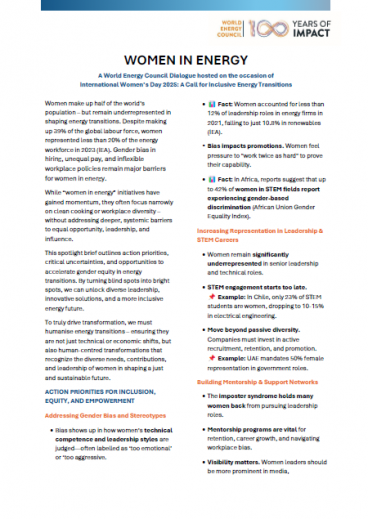'There's no one-size-fits-all': Clean energy a humanising exercise for WEC's Wilkinson
Dr Angela Wilkinson, Secretary General and CEO, World Energy Council
Editor's note: Since the publishing of this piece, it has been determined that it is not feasible for the 2022 World Energy Congress to be held in Russia. Additional information will be published to the Council's website as it becomes available.
This article was originally published in Upstream on 15 June 2021.
The theme of the next World Energy Congress — Energy for Humanity — is a concept that has preoccupied Angela Wilkinson for some time, and likely will continue to be a focus of her energies long after the October 2022 event in St Petersburg, Russia wraps up.
For Wilkinson, secretary general of the World Energy Council (WEC), which organises the triennial event, humanising energy means breaking out of the “technical specialism” that often dominates discussions about energy and sidelines the very people who depend on it.
“It tends to be quite a hubristic space,” she says.
“I've worked around the energy space for decades, and there is a tendency for it to become very technical very quickly. And that's a very exclusive way of thinking about energy. It locks a lot of people out.”
Issues driving the conversation now — energy transition, climate and sustainability — are intrinsically human and demand a different approach, she says.
“We have to be able to engage and involve many different people. And we have to do that in a way which recognises that energy is in the interest of everybody, not just the industry itself.”
The WEC has staked out its own niche in that conversation. Founded in 1923 in part to help stave off international conflicts over energy resources, it has built on that mission to become what Wilkinson calls “a community of co-operation" focused on “how to manage energy for the interests of all of humanity”.
“We operate in any country around the world that wants to establish a member committee,” she says. “But we're not a government organisation. We're a neutral, impartial and impactful community comprising everybody who should be in energy, trying to build energy futures together.”
Energy-plus
WEC is billing the St Petersburg event as “the energy-plus Congress” to reflect a much broader range of energy leaders, Wilkinson says.
“We expect this to be a Congress where the people who see themselves in energy are not just the classic energy industry as we would have talked about it 20 years ago, but are also these new and unconventional actors.”
Such diversification comes with challenges. One trend that emerged in the last World Energy Congress, in Abu Dhabi, was the “growing risk of fragmentation and polarisation” among stakeholders, she says.
“The notion now is that the energy transition is not just happening within the energy industry, but it's happening beyond the energy industry," she adds.
"There are far more players involved, but there’s far greater polarisation of the discourse. It's green versus clean. It's renewables versus gas. We have greater diversity in energy, but we also have greater risk of polarisation.”
A big part of Wilkinson’s task in St Petersburg will be to encourage these various actors “to think of themselves as the world energy community” — to create a space for constructive dialogue and co-operation, turning talk into action.
A trained physicist and author of four books, she brings a perspective shaped by time spent in the industry, including a decade with Shell and an earlier stint with British Gas.
She came to London-based WEC in 2019 from Paris, where she was head of strategic foresight at the Organisation for Economic Co-operation and Development (OECD).
Wilkinson’s global view of community and a desire to foster communication could stem in part from a childhood spent in the UK, Kenya and Singapore.
Understanding cultural differences also informs the WEC’s approach to energy transition, which acknowledges that there are “multiple pathways” to reach low-carbon goals.
Transition
“Transitions are happening, and they're different in different parts of the world because regional energy systems are very different, and so are the societies and the economies on which they depend,” she says.
“There's no one-size-fits-all, which means you've got to engage — that's what we do as a community.
"We are globally networked, but locally deep. We're not here to tell everybody that they should follow what somebody else is doing. We need to say, in your circumstances, with the resources you have and with the co-operations you can build, how can you move in a way where you can have clean, affordable, reliable and sustainable energy?”
Cutting carbon while meeting a growing demand for energy is “a massive challenge for everybody”, Wilkinson says.
“In some countries, they don't have enough energy just to run a fridge for a vaccine. They don't have energy for jobs, or to cook. It's very uneven.
"We have to engage with that and move forward together by respecting that there are going to be different pathways, rather than preaching from the top of the mountain that this is what should happen.”
“We’re all doing energy transition,” she continues. “In the Middle East, that means clean circular carbon economy. In Europe, it means green, right? What does it mean in the US? What does it mean in China?
“The regional missions are different, the pathways are multiple, and the options and technologies are many. And the real challenge is — everybody keeps pumping out goals and roadmaps. But you need the road builders. And that means involving people — as citizens, as customers, as community co-operatives. And for that, we have to get out of this technocratic language box of the industry. That's what I mean by humanising energy,” she adds.
For media queries, please contact us at communications@worldenergy.org






_-80_result_688_387_s_c1_c_c.jpg)

